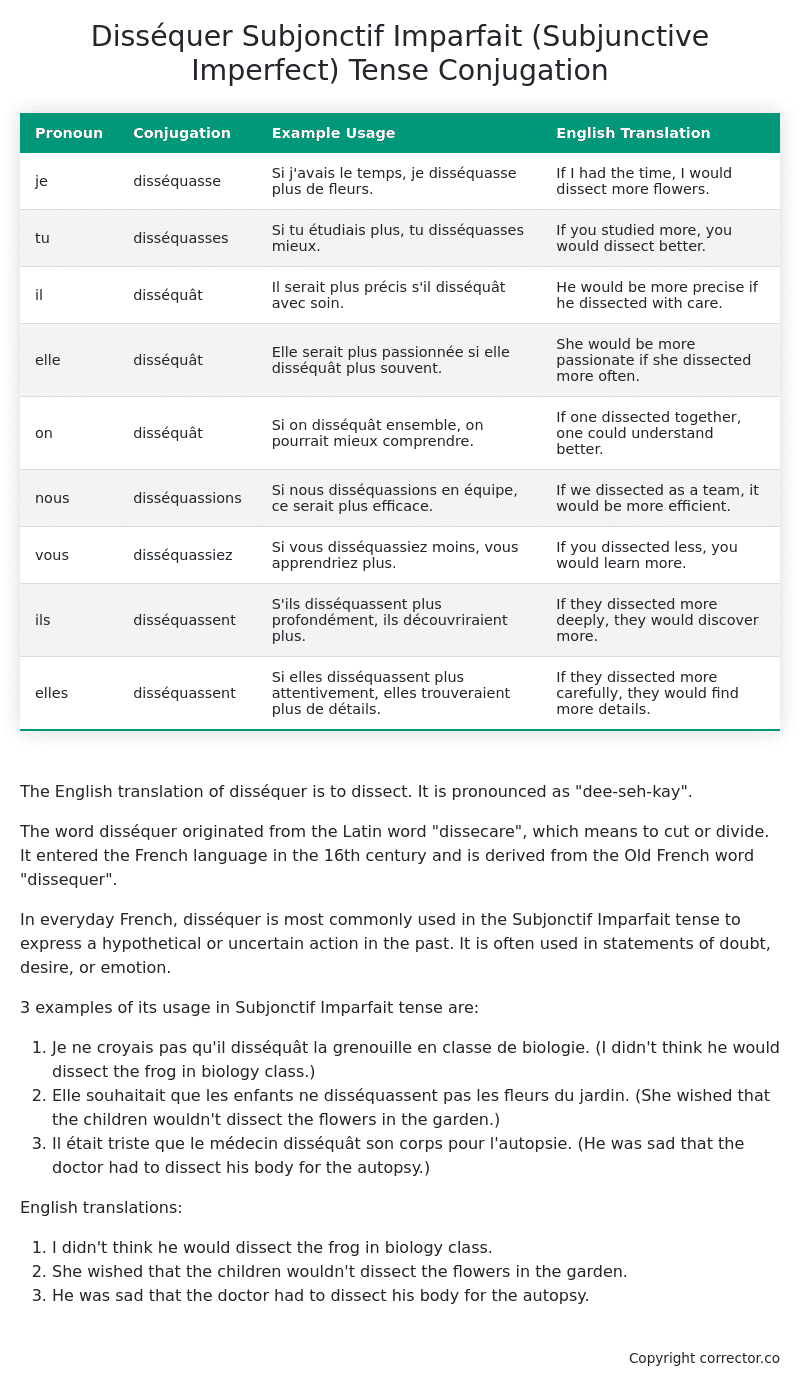Subjonctif Imparfait (Subjunctive Imperfect) Tense Conjugation of the French Verb disséquer
Introduction to the verb disséquer
The English translation of disséquer is to dissect. It is pronounced as “dee-seh-kay”.
The word disséquer originated from the Latin word “dissecare”, which means to cut or divide. It entered the French language in the 16th century and is derived from the Old French word “dissequer”.
In everyday French, disséquer is most commonly used in the Subjonctif Imparfait tense to express a hypothetical or uncertain action in the past. It is often used in statements of doubt, desire, or emotion.
3 examples of its usage in Subjonctif Imparfait tense are:
- Je ne croyais pas qu’il disséquât la grenouille en classe de biologie. (I didn’t think he would dissect the frog in biology class.)
- Elle souhaitait que les enfants ne disséquassent pas les fleurs du jardin. (She wished that the children wouldn’t dissect the flowers in the garden.)
- Il était triste que le médecin disséquât son corps pour l’autopsie. (He was sad that the doctor had to dissect his body for the autopsy.)
English translations:
- I didn’t think he would dissect the frog in biology class.
- She wished that the children wouldn’t dissect the flowers in the garden.
- He was sad that the doctor had to dissect his body for the autopsy.
Table of the Subjonctif Imparfait (Subjunctive Imperfect) Tense Conjugation of disséquer
| Pronoun | Conjugation | Example Usage | English Translation |
|---|---|---|---|
| je | disséquasse | Si j’avais le temps, je disséquasse plus de fleurs. | If I had the time, I would dissect more flowers. |
| tu | disséquasses | Si tu étudiais plus, tu disséquasses mieux. | If you studied more, you would dissect better. |
| il | disséquât | Il serait plus précis s’il disséquât avec soin. | He would be more precise if he dissected with care. |
| elle | disséquât | Elle serait plus passionnée si elle disséquât plus souvent. | She would be more passionate if she dissected more often. |
| on | disséquât | Si on disséquât ensemble, on pourrait mieux comprendre. | If one dissected together, one could understand better. |
| nous | disséquassions | Si nous disséquassions en équipe, ce serait plus efficace. | If we dissected as a team, it would be more efficient. |
| vous | disséquassiez | Si vous disséquassiez moins, vous apprendriez plus. | If you dissected less, you would learn more. |
| ils | disséquassent | S’ils disséquassent plus profondément, ils découvriraient plus. | If they dissected more deeply, they would discover more. |
| elles | disséquassent | Si elles disséquassent plus attentivement, elles trouveraient plus de détails. | If they dissected more carefully, they would find more details. |
Other Conjugations for Disséquer.
Le Present (Present Tense) Conjugation of the French Verb disséquer
Imparfait (Imperfect) Tense Conjugation of the French Verb disséquer
Passé Simple (Simple Past) Tense Conjugation of the French Verb disséquer
Passé Composé (Present Perfect) Tense Conjugation of the French Verb disséquer
Futur Simple (Simple Future) Tense Conjugation of the French Verb disséquer
Futur Proche (Near Future) Tense Conjugation of the French Verb disséquer
Plus-que-parfait (Pluperfect) Tense Conjugation of the French Verb disséquer
Passé Antérieur (Past Anterior) Tense Conjugation of the French Verb disséquer
Futur Antérieur (Future Anterior) Tense Conjugation of the French Verb disséquer
Subjonctif Présent (Subjunctive Present) Tense Conjugation of the French Verb disséquer
Subjonctif Passé (Subjunctive Past) Tense Conjugation of the French Verb disséquer
Subjonctif Imparfait (Subjunctive Imperfect) Tense Conjugation of the French Verb disséquer (this article)
Subjonctif Plus-que-parfait (Subjunctive Pluperfect) Tense Conjugation of the French Verb disséquer
Conditionnel Présent (Conditional Present) Tense Conjugation of the French Verb disséquer
Conditionnel Passé (Conditional Past) Tense Conjugation of the French Verb disséquer
L’impératif Présent (Imperative Present) Tense Conjugation of the French Verb disséquer
L’infinitif Présent (Infinitive Present) Tense Conjugation of the French Verb disséquer
Struggling with French verbs or the language in general? Why not use our free French Grammar Checker – no registration required!
Get a FREE Download Study Sheet of this Conjugation 🔥
Simply right click the image below, click “save image” and get your free reference for the disséquer Subjonctif Imparfait tense conjugation!

Disséquer – About the French Subjonctif Imparfait (Subjunctive Imperfect) Tense
Formation
Common Everyday Usage Patterns
Interactions with Other Tenses
Subjonctif Présent
Indicatif Passé Composé
Conditional
Conditional Perfect
Summary
I hope you enjoyed this article on the verb disséquer. Still in a learning mood? Check out another TOTALLY random French verb conjugation!


